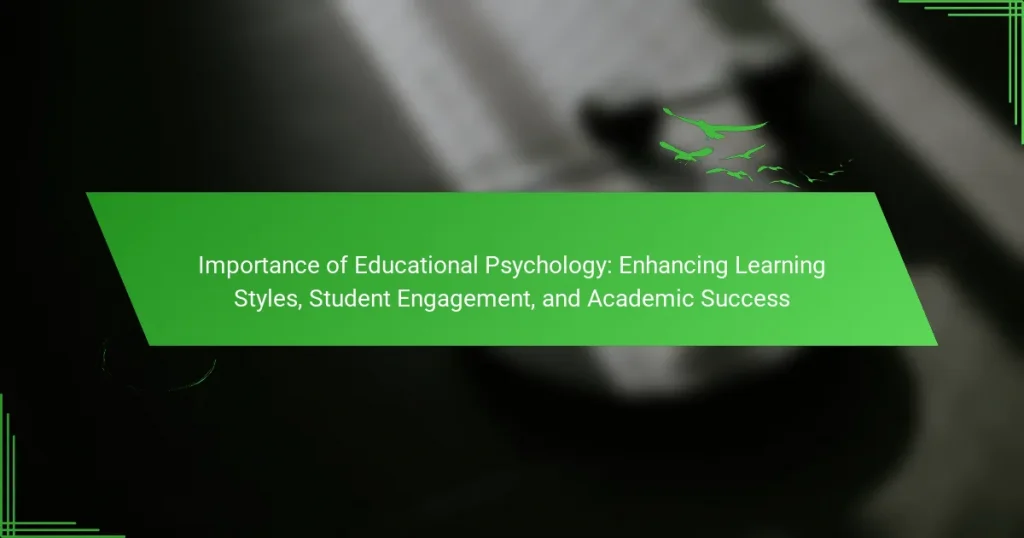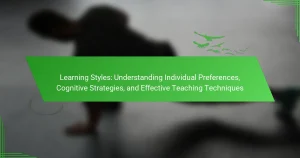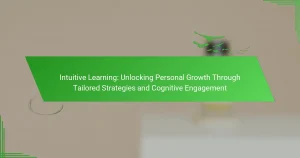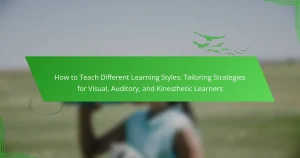Understanding the importance of educational psychology is essential for enhancing learning styles, boosting student engagement, and achieving academic success. Tailored educational approaches that align with individual learning preferences can significantly improve retention and motivation. Additionally, insights into cognitive development and personalised learning strategies foster deeper understanding and critical thinking. By applying educational psychology principles, educators can create effective learning environments that support diverse student needs and promote academic performance.
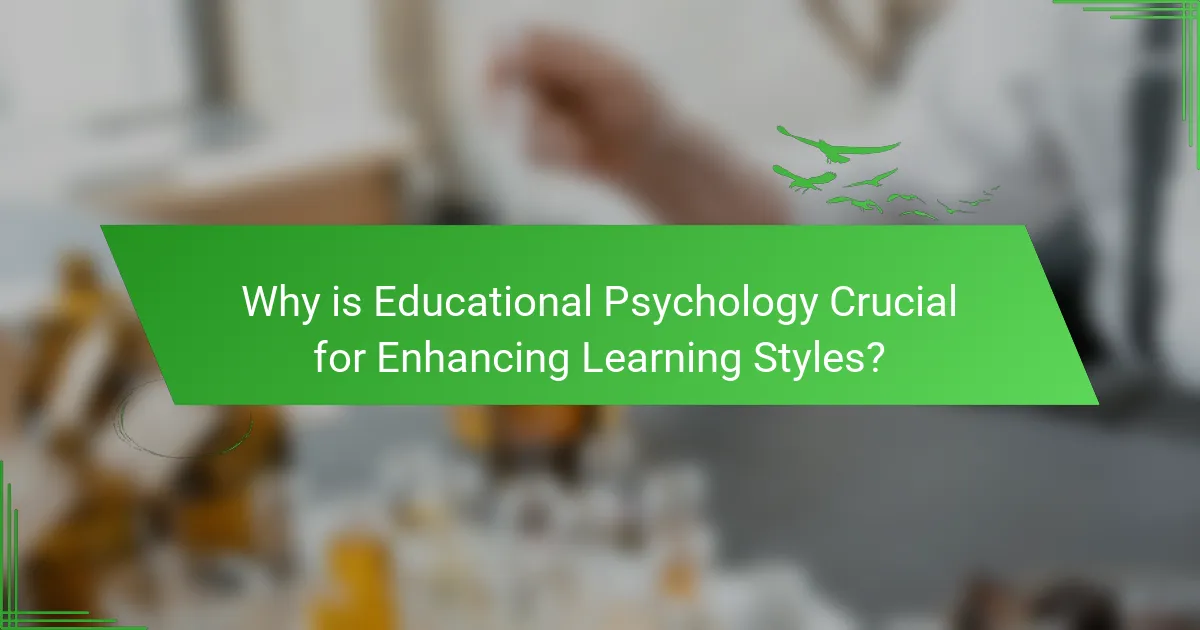
Why is Educational Psychology Crucial for Enhancing Learning Styles?
Educational psychology is crucial for enhancing learning styles as it tailors educational approaches to individual needs. By understanding diverse learning preferences, educators can engage students more effectively, leading to improved academic success. For instance, research shows that students who receive instruction aligned with their preferred learning styles exhibit higher retention rates and motivation. Additionally, educational psychology provides insights into cognitive development, enabling customised strategies that foster deeper understanding and critical thinking skills. This alignment between teaching methods and learning styles ultimately enhances student engagement and academic performance.
What are the key principles of Educational Psychology?
Educational psychology enhances learning by focusing on key principles that promote effective teaching methods, student engagement, and academic success. These principles include understanding diverse learning styles, applying motivational strategies, and utilising assessment techniques to tailor educational experiences. By recognising the unique attributes of each student, educators can foster an environment that encourages active participation and critical thinking. This tailored approach not only improves retention but also supports overall academic achievement.
How do learning styles impact student engagement?
Learning styles significantly enhance student engagement by aligning teaching methods with individual preferences. For instance, visual learners benefit from diagrams, while auditory learners thrive on discussions. Research indicates that personalised learning approaches can increase motivation and participation, leading to improved academic success. Adapting educational strategies to various learning styles fosters a more inclusive environment, ultimately enhancing overall student performance.
What are the different types of learning styles?
There are several types of learning styles, including visual, auditory, reading/writing, and kinesthetic. Each style influences how students engage with material and enhances academic success. Understanding these styles allows educators to tailor their approaches, fostering better student engagement and retention. Visual learners benefit from diagrams and charts, auditory learners excel with lectures and discussions, reading/writing learners thrive on texts, and kinesthetic learners gain from hands-on activities. Recognising these differences is crucial for effective educational psychology.
How can learning styles be assessed effectively?
Learning styles can be assessed effectively through a combination of observations, surveys, and adaptive learning technologies. Observational assessments allow educators to notice students’ engagement and preferences in real-time. Surveys can gauge individual learning preferences, providing insights into how students best absorb information. Adaptive learning technologies further personalise the assessment process by analysing student interactions and adjusting content delivery accordingly. This multifaceted approach enhances educational psychology’s role in promoting academic success through tailored learning experiences.
What role does motivation play in learning?
Motivation is crucial in learning as it drives student engagement and enhances academic success. High motivation leads to increased effort, persistence, and a willingness to tackle challenges. Research indicates that motivated students are more likely to adopt effective learning strategies, resulting in better retention and understanding of material. Unique attributes of motivation, such as intrinsic versus extrinsic motivation, significantly influence learning outcomes. Understanding these dynamics allows educators to tailor their approaches, fostering an environment that promotes sustained motivation and academic achievement.

What are the unique attributes of Educational Psychology in academic success?
Educational psychology uniquely contributes to academic success by addressing individual learning styles, fostering student engagement, and enhancing motivation. These attributes support personalised learning experiences, which lead to improved academic outcomes. Research shows that tailoring educational approaches to fit diverse learning preferences can significantly boost retention and comprehension. Moreover, strategies derived from educational psychology, such as growth mindset and self-regulated learning, empower students to take ownership of their education, further enhancing their academic performance.
How does Educational Psychology adapt to diverse learning needs?
Educational psychology adapts to diverse learning needs by employing tailored strategies that enhance student engagement and academic success. It recognises individual learning styles, allowing educators to implement differentiated instruction. This approach fosters inclusivity by addressing unique attributes such as cognitive abilities, emotional factors, and cultural backgrounds. For example, visual learners benefit from graphic organisers, while kinesthetic learners thrive with hands-on activities. As a result, educational psychology promotes a more effective learning environment that caters to various student profiles, ultimately improving educational outcomes.
What innovative strategies enhance student engagement?
Innovative strategies that enhance student engagement include interactive learning, technology integration, and collaborative projects. These approaches cater to diverse learning styles, fostering active participation and deeper understanding. For example, gamification techniques boost motivation and retention, while peer-to-peer learning cultivates a supportive environment. Regular feedback mechanisms further personalise learning experiences, ensuring students remain invested in their academic journey.
What are the benefits of collaborative learning approaches?
Collaborative learning approaches enhance critical thinking, communication skills, and social interaction among students. They foster a sense of community, increasing student engagement and motivation. Research indicates that collaborative learning can lead to higher academic achievement and retention rates. This approach allows diverse perspectives, enriching the learning experience and developing teamwork skills essential for future success.
How can technology facilitate personalised learning experiences?
Technology facilitates personalised learning experiences by tailoring educational content to individual student needs. Adaptive learning platforms analyse student performance in real-time, adjusting difficulty levels and learning paths accordingly. This approach enhances engagement by aligning with unique learning styles, promoting academic success. For instance, data-driven insights enable educators to identify areas where students struggle, allowing for targeted interventions. As a result, technology not only supports diverse learning preferences but also fosters a more inclusive educational environment.

What rare attributes of Educational Psychology contribute to long-term academic success?
Educational psychology’s rare attributes, such as personalised learning approaches and metacognitive strategies, significantly enhance long-term academic success. Personalised learning tailors educational experiences to individual student needs, fostering deeper engagement and understanding. Metacognitive strategies empower students to reflect on their learning processes, leading to improved self-regulation and academic performance. These attributes create a supportive learning environment that promotes resilience and adaptability in students.
How does emotional intelligence intersect with learning styles?
Emotional intelligence significantly enhances learning styles by fostering self-awareness and empathy, which improve student engagement. Students with high emotional intelligence adapt their learning strategies based on their emotional responses and those of their peers. This adaptability leads to better academic success. Studies show that integrating emotional intelligence training can boost academic performance by up to 20%. Understanding one’s emotional triggers allows for tailored learning approaches, making education more effective.
What are the implications of cultural differences in learning?
Cultural differences in learning significantly affect educational outcomes. Understanding these implications enhances student engagement and academic success.
Cultural backgrounds influence learning styles, communication preferences, and motivation. For instance, collectivist cultures may prioritise group work, while individualistic cultures emphasise personal achievement.
Educators must adapt teaching methods to accommodate diverse cultural perspectives. This approach fosters an inclusive environment that respects and values differences, leading to improved student performance.
Research indicates that culturally responsive teaching can lead to higher academic achievement. Tailoring lessons to reflect students’ cultural experiences enhances relevance and retention of information.
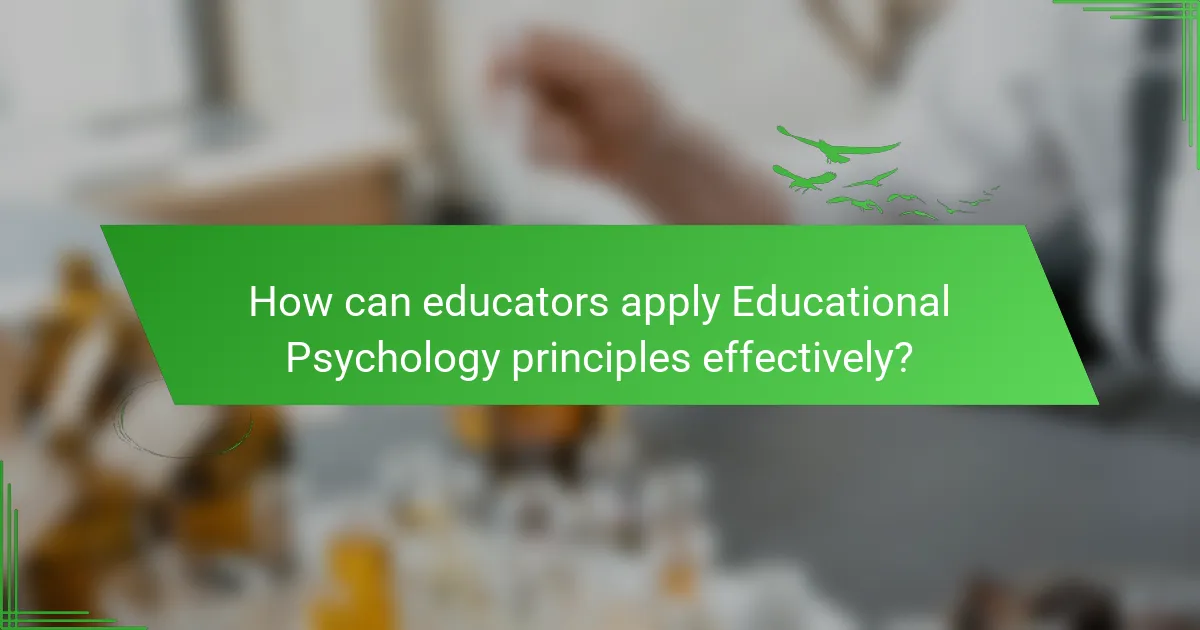
How can educators apply Educational Psychology principles effectively?
Educators can effectively apply Educational Psychology principles by tailoring teaching strategies to diverse learning styles. Understanding cognitive development aids in enhancing student engagement and promoting academic success. For instance, incorporating active learning techniques can foster deeper understanding and retention of material. Additionally, applying formative assessments helps educators identify individual student needs, allowing for targeted interventions. This approach not only supports different learning preferences but also builds a positive classroom environment.
What best practices enhance student engagement and learning outcomes?
Incorporating best practices such as active learning, collaborative activities, and formative assessments significantly enhances student engagement and learning outcomes. Active learning strategies, like problem-solving tasks, encourage participation and critical thinking. Collaborative activities foster peer interaction, which improves motivation and retention. Formative assessments provide timely feedback, guiding students toward academic success. Research shows that these approaches lead to higher achievement levels and increased student satisfaction.
What common mistakes should educators avoid when applying these principles?
Educators should avoid oversimplifying concepts, neglecting diverse learning styles, and failing to assess student engagement. These mistakes can hinder academic success. For example, assuming all students learn the same way can limit effective teaching strategies. Additionally, overlooking the importance of formative assessments can lead to misinterpretations of student progress. Engaging students through varied instructional methods is crucial; thus, avoiding reliance on a single teaching approach is essential.
How can continuous professional development improve teaching strategies?
Continuous professional development enhances teaching strategies by equipping educators with updated knowledge and skills. It fosters adaptive teaching methods tailored to diverse learning styles, improving student engagement and academic success. Research indicates that teachers who engage in ongoing training are more effective in implementing innovative strategies that meet individual student needs. This commitment to professional growth ultimately leads to improved educational outcomes and a more dynamic classroom environment.
